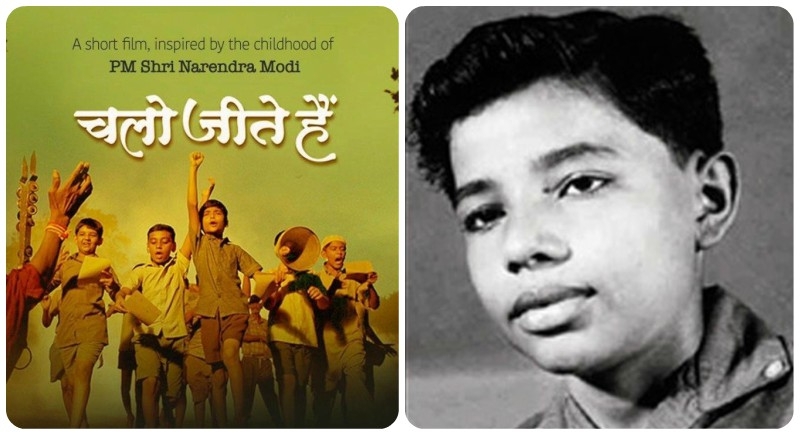#ChaloJeeteHain: Movie based on childhood memories of PM Modi inspire millions
New Delhi, July 30: We see Narendra Modi Modi working round the clock for his country as a Prime Minister. Sometimes many questions arise in our mind that how he manages his schedule? How he lives? How he grew up? How was his childhood? Because we have heard much that he was a tea vendor during his childhood days. So a biographic movie has been released named ‘Chalo Jeete Hain’ (Directed by Mangesh Hadawale) which is inspired from the childhood days of our beloved PM.

During the screening, BJP Parivar along with President Amit Shah watched this short film and appreciated the movie. The special screening of this movie was held in Mumbai a day before the release. In the special screening of 'Chalo Jeete Hain', almost whole Bollywood was present. Even the business tycoons the Ambanis, players and all the big leaders came. During this, everyone has appreciated the film.
The hero of the plot is Naru (Narendra Modi), whose mind is constantly caught up with one question: “Who do you live for?" (Aap kiske liye jeete ho). He first asks this question to his mother when she is cooking in their ramshackle house. The mother tells him to ask his bapu (father). A tired father running a tea stall at Vadnagar Railway Station shuts him down. He is advised to ask the question to his class teacher (Guruji) instead.
In his class room, his classmate from a Dalit scavenger family, Harish Solanki, is absent from class for days together. Every day, when the class teacher takes attendance and when the name of Harish comes up, the entire class says in a chorus, 'absent, absent'.
While helping his father at his station tea stall in his free hours, Naru asks Harish and his sweeper mother as to why doesn’t he attend school. The annoyed and disturbed mother asks whether she should fill her family’s stomach or pay for Harish's school expenses.
Naru finds the family’s poverty —their inability to buy his school dress — is the reason for Harish’s absence. Next, he requests Guruji as to why he can’t allow Harish to attend classes wearing his regular dress, considering his poverty. The teacher says rules once broken can create anarchy.
Here, the film’s director, Mangesh Hadawale, beautifully brings out Modi’s by-now well-known commitment to discipline and systems.
After a few days, Naru gets to play the role of a boy in a village drama. He brings the village audience to tears with his moving portrayal of a scorned Dalit boy. A rich merchant in the audience is so impressed with his performance that he gives money to Naru in the form of a prize.
With that money, Naru buys a school dress for Harish.
The next day, when the class teacher is about to mark Harish absent, he enters the classroom to the joy of the entire class and the class teacher himself.
The producers Anand L Rai — maker of the film Tanu Weds Manu — along with Mahavir Jain and director Hadewale, haven’t over-played Naru’s poverty. He wears a neat school dress with a red sleeveless sweater. Here, they bring out a very well-known Modi trait. Though from a poor family, Modi always wore neat clothes, even ironing his shirts with a hot water-filled metal bowl.
The film is shot in real-life situations in his hometown Vadnagar. The house where Naru and his family lived is true-to-life. The actual house where Modi lived as a child has been sold and renovated, but his cousins in Vadnagar live in very similar homes. Even the school shown in the biopic is the same in which Modi studied. The roles of Naru and Harish, played by child artistes Dhairya Darji and Dev Modi respectively, are superb.